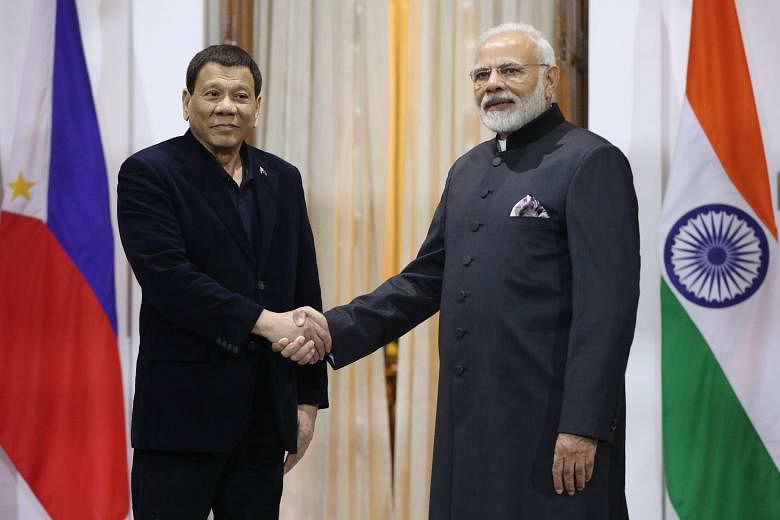MANILA (PHILIPPINE DAILY INQUIRER/ASIA NEWS NETWORK) - Amid China's aggressive use of force, India is harnessing its soft power anchored on commerce, connectivity and culture to strengthen ties with Southeast Asian nations including the Philippines.
The battle of China and India for supremacy in Southeast Asia is inevitable.
The challenge for smaller nations like the Philippines is how to nurture strategic partnerships with Beijing and New Delhi, other global powers, and multilateral mechanisms to increase their trade and commerce, and achieve peace, stability and development.
Indian Prime Minister Shri Narendra Modi has correctly pointed out the potential of the Asean-India partnership anchored on "shared values and common destiny." He stressed that we are living in an "age of change, disruptions and shifts that comes only rarely in history."
Asean and India share an interest in peace and security in the region, and an open, balanced and inclusive regional architecture.
It will be interesting to see how enhanced Asean-India relations will affect the geopolitics in the South China Sea in the coming years. More than 50 per cent of Indian trade passes through the South China Sea and Straits of Malacca.
Many international experts believe that India's "Act East" policy strengthens its potential to become a "counterweight to China's rise."
With its military and economic capabilities, India can use the fullest potential of its soft power to assert its role as a regional catalyst of integration and power.
Singaporean Prime Minister Lee Hsien Loong has cited the strength of Asean and India's combined population of 1.8 billion, a quarter of the world's population with a combined GDP exceeding US$4.5 trillion.
According to Lee, by 2025 India's consumer market is expected to become the world's fifth largest, and middle-class households in Southeast Asia will double to 163 million.
The Philippines should take advantage of the growing Indian market. As of 2016, in terms of value, India accounts for only 1.3 percent of the total trade of the Philippines, while China and Japan account for 15.5 percent and 15.2 percent, respectively.
The rapport between Prime Minister Modi and President Duterte can provide the needed boost to deepen economic relations, as well as defence and security cooperation between India and the Philippines. And bilateral ties can further bolster the value of the Democratic Security Diamond (or the "Quad") in strengthening and developing the Philippines' maritime capabilities.
Along with maximising bilateral relations with the other Quad members - Japan, Australia, and the United States - the Philippines' healthy ties with India would be greatly beneficial to us.
Think in terms of benefiting from India's advanced defense technology through technology transfer and procurement of military arms and equipment.
India and Asean have reaffirmed the importance of maintaining peace, freedom of navigation and overflight in the region, as well as peaceful resolution of disputes in accordance with international law. Their joint statement backed the full and effective implementation of the Declaration on the Conduct of Parties in the South China Sea, and called for the early conclusion of talks on the Code of Conduct in the South China Sea.
They also reaffirmed their commitment to work closely together on regional and international security issues of mutual concern and to ensure an open, transparent, inclusive and rules-based regional architecture.
The use of phrases like "rules-based regional architecture," "freedom of navigation" and "peaceful resolution in accordance with international law" in the joint statement contradicts China's militarisation and continuous reclamation of lands in disputed areas in the South China Sea.
With India's growing influence, and the cooperation of other relevant states, we can resolve territorial disputes peacefully and prevent "unilateral coercive actions" in disputed areas. Thus, freedom of navigation and overflight can be ensured to facilitate more trade.
The strategic partnership of Asean and India is not a panacea, but it can be a step in the right direction. It can either ease tensions and promote regional security, or alienate China on the issue of maritime disputes.
The writer is a regular columnist with Philippine Daily Inquirer. The paper is a member of The Straits Times media partner Asia News Network, an alliance of 23 news media.

